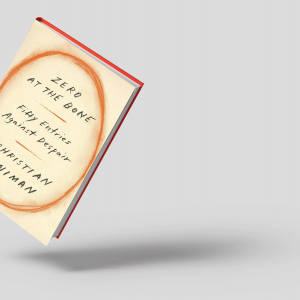
Jenna Barnett (@jennacbarnett) is the senior associate culture editor at Sojourners and the host of the audio limited series Lead Us Not. She was born in San Antonio and lives in San Diego. She has a B.A. in sociology and religion from Furman University and an M.F.A in Literary Reportage from New York University.
Before joining the Sojo team, Jenna managed the International Rescue Committee’s urban gardens in San Diego, and worked as a writer for the Women PeaceMakers Program at the Kroc Institute for Peace and Justice.
She has written for McSweeney’s, Texas Monthly, the Belladonna, and New York Magazine’s Grub Street. You’re likely to find her playing basketball, watching women’s soccer, eating homemade flour tortillas, or taking her time in Scrabble.
Some Sojourners articles by Jenna Barnett:
Culture:
Brandi Carlile’s Radical Gospel of Gentleness
“What I'm talking about is radical, filthy, trembling, scary, life-changing, beautiful forgiveness,” the Grammy-winner told Sojourners in an interview.
Snorting Nutmeg at Vacation Bible School with Lucy Dacus
Her album Home Video could have just as easily been named “Youth Group” or maybe “Adventures in Suburbia.”
Features:
How Do We Recover When Our Leaders Betray Us?
Charismatic leaders like Jean Vanier can inspire our faith — or make it fall apart.
Let There Be Light
When sexual abuse occurred in their church, Rev. Heidi Hankel and her congregation refused to let it stay hidden.
Humor:
Footprints in the Sand (Unedited)
Lord, when I needed you most, why were you snacking on Flamin' Hot Cheetos?
John the Baptist’s Recipe for Honey-Crisped Locusts
Once the locusts are as hot as a wealthy hypocrite burning in hell (about 200 degrees), add the honey.
Posts By This Author
14 Rachel Held Evans Quotes on Doubt and Other Key Parts of Christian Faith
Sometimes I am haunted by Glennon Doyle’s forward to the late Rachel Held Evans’ book Searching for Sunday. Doyle begins: “Whenever I want to scare myself, I consider what would happen to the world if Rachel Held Evans stopped writing.” In 2019, about four years after those words were published, Evans died. She was 37, survived by her husband, two kids, and Christians around the world who found comfort in her faith-rooted advocacy for racial justice, LGBTQ+ rights, and egalitarianism.
10 Quotes From Mary Oliver, the Patron Saint of Paying Attention
Mary Oliver often explored big existential questions with the unlikeliest of philosophical partners: moss, roses, geese, dogs, waves. They all had interesting things to say to her. In a 2015 interview with Krista Tippett, Oliver explained that there is nothing more interesting to her than spirituality. “So I cling to it,” she said. “I have no answers, but have some suggestions.” Her poems are riddled with those suggestions. Here are some of my favorites
Hoping for the Best, Preparing for the Worst
FIRST, I WILL tell you what “The Parable of the Ten Bridesmaids” is not:
It is not a dark comedy starring Kristen Wiig, Kristen Stewart, Kristen Bell, and six other Kristens about a bachelorette party’s riverboat cruise crashing on the shores of a money-crunched Christian summer camp.
“The Parable of the Ten Bridesmaids” is also not a Sufjan Stevens song about the 10 different types of clouds that hang over Lake Michigan in late autumn, just as wedding season draws to a close.
And, like most campfire tales Jesus told, it is not singular in its meaning.
Worship Songs for the Disillusioned
I WANT TO believe there’s a live band at a church somewhere in the U.S. playing Joy Oladokun’s latest album, Observations From a Crowded Room. After all, Oladokun is no stranger to sanctuaries: By the time she was 16, Oladokun was leading the worship music at the charismatic nondenominational church her family attended. But around the age of 24, she quit, explaining in an interview with NPR, “I just felt like so much of my attention was going towards taking care of people and singing the right songs and not saying the wrong thing on Sunday.”
I think, for a long time, I’ve been looking for a church willing to risk singing the wrong thing on Sunday—to risk singing something like these lyrics from Oladokun’s “Dust/Divinity”: “I’m a skeptic who still prays / ... ’Cause though it hurts me to believe / It kills me not to / And I am trying to find my way through the middle / And I am desperate to receive every good thing / From now until eternity / From dust until divinity.”
Sojourners’ Top Movies of 2024
The films below feature characters — real and fictional — who doubt, who sin, who ask for forgiveness, and who try to carry on and seek justice in a universe full of violence, corruption, and sickness, but also humor, love, and reconciliation.
Goals for My Jesus Year
I AM ABOUT to begin my Jesus Year. Which is to say, I’m one month away from turning 33, the age that many scholars believe Jesus was when he expelled demons, performed miracles, overturned tables and norms, and lived so counter to the expectations of empire that he was crucified for it, therein saving humanity with a radical act of peace and love.
Now, I don’t plan on doing all that. It’s already been done! But I love that Christians have transformed a random age into something significant. Most of the monumental birthdays of youth are behind me: I can already drive (16), I can vote (18), I can drink (21), I can rent a car without paying a surcharge (25), and I can get injured anytime I go for a jog without stretching (32). But 33 is even more special. While I don’t plan on dying, resurrecting, restoring, and ascending, I do have a few goals for my Jesus Year.
How Pastors Prepared for the Sunday After a Bitter Election
Rev. Jes Kast started planning for the Sunday after the election in midsummer, before her three-month sabbatical. She’d timed her leave intentionally, wanting to return to her congregation well-rested, right before one of most contentious elections in U.S. history. “I had a sense in my spirit that this next phase in ministering, whatever the outcome of the election, would require me to be as spiritually grounded as possible,” said Kast, who pastors Faith United Church of Christ in State College, Pa.
The Author Writing Young Adult Fiction Full of Queer Faith Stories
In the queer, young adult novel She Drives Me Crazy, author Kelly Quindlen employs a couple of my favorite romance tropes: A fake-dating scenario and an enemies-to-lovers story arc. But when I first read the novel a few years back, I was also delighted by all the plotlines and character traits I’d never encountered in a sapphic YA romance: The two main characters — high schoolers Scottie (star of the girls’ basketball team) and Irene (captain of the cheerleading squad) — are both Catholic, and, most significantly, their Catholicism is not in conflict with their sexuality. Both Scottie and Irene’s parents are affirming; their queerness is a nonissue for their families and their church.
My Definitive Ranking of Church Potluck Staples
I MISSED SEVERAL church services growing up, but I rarely missed quarterly potluck Sundays. As Jesus modeled through his ministry and miracles, free food is an essential motivator. But alas, not all free food is created equal. So here is my definitive ranking of church potluck staples — the good, the bad, and the divisive. Because this is a Christian ranking, we’ll go in ascending order: The first shall be last.
7. Lemon Sugar Water
Don’t trust an aluminum container labeled “lemonade,” especially if it’s beside the dispenser of “coffee,” aka “coffee-flavored water” (I said what I said). The deacons thought two packets of Country Time Lemonade mix could multiply for the masses, but it is a diluted miracle, at best.
6. Stone Soup
I loved the parable the first time Pastor Jerry shared it during the children’s sermon: A stranger comes to town with an empty pot, throws in some stones, and stirs it with such prolonged passion that neighbors begin showing up, adding carrots, potatoes, and more until the soup is big enough to feed the whole town. A good lesson on how to trick strangers into being hospitable. But you can’t keep bringing a vat of stones to the potluck, Jerry. It’s a choking hazard, and the rocks look suspiciously like our parking lot gravel.
Christian Wiman Pushes Back Against Despair
IN HIS LATEST book, Zero at the Bone: Fifty Entries Against Despair, Christian Wiman is not concerned with suspense. Two paragraphs into his first “entry against despair,” he discloses the fiercest nemesis of that tried-and-true doom and gloom. “The only true antidote to the plague of modern despair is an absolute — and perhaps even annihilating — awe,” he writes.
That’s probably why Wiman, writer, translator, and professor of communication arts at Yale Divinity School, begins Zero at the Bone by mining the wisdom of the world’s biggest experts on awe: children. His latest collection leans on the “visionary innocence” of a child “whose unwilled wonder erases any distinction between her days and her dreams.” Wiman has had daily access to two such visionaries: his twin daughters Eliza and Fiona.
Unfortunately, he has also had steady access to despair, most visibly through his 19-year battle with a rare, aggressive form of bone cancer. He is currently in remission.
From the Mouths of Babes and the Ears of Whales
LAST WINTER I woke up to 24 text messages on the family chain, which could only mean that someone had died, or someone was pregnant, or the San Antonio Spurs had finally decided to end their rebuild and trade four first-round draft picks for star point guard Trae Young. But I was wrong. My 2-year-old nephew Sébastien had asked his first theological question. The question arrived, according to my sister, around 6 a.m., an ungodly time for existential matters.
“What is a soul, mama?” Séb asked her. My nephew had been running through the lyrics of “Frosty the Snowman,” wondering what it meant to have a “jolly, happy soul.”
I FaceTimed my sister to learn more. “How did you respond?” I don’t have any kids — yet — so her anecdote was equal parts thrilling and terrifying.
Coming Out Doesn’t Have To Be a Horror Story
IN THE GEN-Z romance XO, Kitty, Netflix platformed an uncommonly tender father-daughter exchange. “I have feelings for my friend Yuri, who’s a girl,” says Kitty, an American attending high school in Seoul, Korea. Speaking to her father across continents and generations, she’s visibly nervous to come out. He’s nervous too, but only because his daughter called him in the middle of the night. “Oh, thank God,” he exhales. Confused, she asks, “Thank God I’m bi? Or pan? Or fluid?” He smiles. “Whatever pan or fluid is, thank God you’re safe and healthy.”
I realize it’s doubtful the father is literally engaging the divine here — I don’t even know if he’s Christian — but I’ll take what I can get. Depictions of religious parents embracing their children’s queerness are rare. Christian coming-out stories are usually serious dramas, not binge-worthy rom-coms.
Our Favorite Oscar-Nominated Films — And Where to Watch Them
The greatest single line in cinema of the past 12 months was delivered inside of a Barbie Dreamhouse.
Sojourners’ Best Books of 2023
Each book, whether subtly or overtly, shows readers how to build community in the face of both real and existential danger.
God, Please Pass Along This Message to My Pet
AS A KID, I had a fraught relationship with my cat, Buddy. I know what you’re thinking: “Buddy?? What a basic name.” Well, I couldn’t agree more. I was 5 when we got him, and unfortunately, I was not trusted with the responsibility of choosing a name. To placate me, my parents told me I could come up with the middle name and the last name of the new cat (I don’t know why Buddy didn’t take on our family’s surname — “Buddy Barnett” has a nice ring to it). I christened him “Buddy Bear Donkey.”
Maybe that’s why Buddy hated me. His disdain for me was different from most cats’ aversion to small children. He didn’t run from me or hide beneath couches, both conventional and understandable responses to overzealous hugs. No, Buddy didn’t seek avoidance; he pursued revenge. The orange tabby cat sought me out when I was weakest: at 5 a.m., in my deepest slumber. He would climb on my bed, dip his deceptively cute head under the covers, and bite (not nibble!) my toes.
In the morning, I would find him so that we could make up. Hug it out. Ask him, “What had I done to deserve this?” But I couldn’t get through. I even watched The Aristocats, hoping I could learn something about Buddy. Perhaps, like the Duchess and her kittens, Buddy had a love of the piano. I played him my best rendition of “Hot Cross Buns.” (In retrospect, he might’ve been hoping for a more refined tune. Perhaps an arpeggio or some coffeehouse Norah Jones).
What Is Spiritual Abuse? And How Do We Heal From It?
What is spiritual abuse in the church and how do we heal from it? Spiritual abuse is “a distortion and exploitation of spiritual authority to manipulate, control, use, or harm others, mostly through shame and fear,” Rachael Clinton Chen told Sojourners. The warning signs of spiritual abuse include intolerance for questions and doubts and using the Bible to arouse fear. Healing from spiritual abuse will be possible with time, therapy, and truth-telling among people who are known and trusted.
As the World Cup Kicks Off, U.S. Women’s Soccer Has Already Won
IN THE SUMMER OF 2019, I fulfilled one of my childhood dreams: I cheered from the stands as the U.S. Women’s National Team won the FIFA Women’s World Cup in France.
This summer, I’ll be traveling to New Zealand and Australia to watch the team compete to win a third straight World Cup, a feat never before accomplished. I loved every moment of the 2019 tournament — the clutch penalty kicks and the cheeky goal celebrations — but two of my favorite moments came right after the final whistle blew.
The crowd of 57,900, which had been loud the whole game, got even louder.
The first chant was an easy and obvious way to cheer on the new champs: “USA! USA! USA!” I said it a couple times, but not with much gusto. It felt weird. If I said those letters, I wondered, what exactly was I cheering on? Just the team? Or also the U.S. president (at the time, Donald Trump) and his administration’s policies?
Fortunately, the chant shifted to one I could get behind wholeheartedly. As FIFA president Gianni Infantino, head of the international soccer governing body, walked to center field to begin the trophy ceremony, people around me started chanting: “EQUAL PAY! EQUAL PAY! EQUAL PAY!” Drummers behind the goal line punctuated the sound. Within seconds, the whole stadium had joined in.
At the time, a top-performing player on the U.S. Women’s National Team (USWNT) earned only 38 percent of what was earned by a top-performing player on the U.S. Men’s National Team. But as of 2022, the USWNT signed a collective bargaining agreement with the U.S. Soccer Federation that ensures that the national women’s team will be paid at the same rate for game appearances and tournament victories as the men. With this agreement, the U.S. team is setting a powerful global example.
The Joy and Terror of Quitting Alcohol
SOBER SPIRITUALITY by Erin Jean Warde is ultimately an invitation for readers to ask themselves, “How do I want to be in a relationship with alcohol?” Warde, an ordained Episcopal priest, spiritual director, and sobriety coach, asked this question of herself years ago. She ultimately chose sobriety but realizes that won’t be where everyone lands. And Warde also wants the whole church, not just individuals, to engage this question.
Because, according to Warde, the church’s current relationship with alcohol is pretty toxic — especially in progressive churches. Progressive denominations often work to distinguish themselves from fundamentalism and much of white evangelicalism, communicating, “Yes, we’re Christian, but not that type of Christian” — not the type that is hostile to immigrants and bars women and LGBTQ people from the pulpit.
But one of the ways progressive churches have signaled this distinction, Warde argues, is harmful: “by illustrating how much they drink or that they drink at church.” Events like “Beer & Hymns” or “Theology on Tap” come to mind. This type of laid-back programming quickly communicates to newcomers that the host church isn’t dogmatic or old-fashioned. But it sends a different message to people who are sober or sober curious. “The common refrain of ‘all are welcome’ must ring true when a person changes their relationship with alcohol,” Warde writes.
A Gift (and Survival) Guide for Jesus Feminists
THERE'S NEVER A bad time to show a woman you value that she’s a woman of valor. But there are bad gifts. Just because your favorite Jesus feminist loves Mary Oliver, for instance, doesn’t mean you should gift her a wild goose — no matter how harsh and exciting the goose may be. Also, do not arrange a telegram delivered to her by a man dressed in a gazelle outfit reading the Song of Songs; her parents might be over for Sunday dinner! And I can’t emphasize this enough: Do not gift her an animatronic infant in a basket floating down a river. I learned that one the hard way.
But don’t worry, there are plenty of other options:
The Pros and Cons of Twitter Blue for Me, Jesus, Son of God
Given my preferential option for the poor, would it seem kinda hypocritical of me to pay a billionaire for a blue check mark?



















